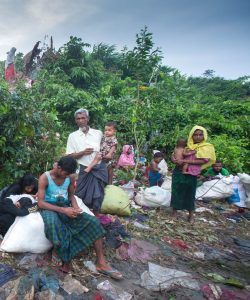
Medecines sans Frontieres (MSF) hosted their annual scientific research day at the Royal Society of Medicine, London, United Kingdom on 24 May 2018. MSF is perhaps best known for the medical work they do in the most challenging conditions around the world. The association, made up mainly of health care professionals, strives to provide health care where it is needed the most and to provide a voice to those in crisis settings through programming and research. The research showcased during the scientific research day highlighted the work being done by MSF staff in conditions that bring new meaning to the phrase “resource-limited.”
Vulnerable contexts
From populations that have been displaced due to climate change to those that have fled their homes due to political conflict, this year’s talks focused on the most vulnerable and the most neglected. Maternal health is often overlooked in times of civil unrest, public health or humanitarian crises, creating a further disadvantaged subset of the already vulnerable population. However, on the scientific research day we heard results from several promising projects that hope to improve health care for women.
The ongoing civil unrest in Somali region, Ethiopia has created a large vulnerable population of refugees and MSF have been filling the gaps in health care services here since 1984. Beverley Stringer (MSF London) shared perspectives of women in Dollo Zone, Somali Regional State on reproductive health and whether there were gaps in the healthcare they received. What were the barriers to accessing health care? “Hoping for life while fearing death”, women in this region indicated the need for a responsible adult who can assist, support and reduce the delay in getting help. Women reported facing delays in receiving health care because of group dynamics during decision making and were often negotiated against other priorities in the household. The overall perspectives shared by women in this region indicated that a more community-based approach was needed to improve access to health care. Improved access would also require increasing the effectiveness of health extension workers by providing additional training in the community.
Integrated services
To reduce maternal and neonatal mortality in low resource settings, the focus is usually on the provision of antenatal care. Mpumi Mantangana of MSF Cape Town discussed postnatal clubs in South Africa aimed to improve the uptake of HIV services for mother-infant pairs, an innovative model adapted from anti-retroviral adherence clubs. Integrating maternal, child health and HIV services in postnatal clubs provided combined health care opportunities for mothers infected with HIV and their infants. This intervention showed high retention for the mother-infant pairs as well as high rates of viral suppression. According to Mpumi, women felt postnatal clubs provided them with peer support, advice and a reduction in stigma. Postnatal clubs provided mothers with education on the mental and physical aspects of health which had a positive effect on health behaviors. Since this model involves provision of comprehensive care, there are issues related to sustainability. Unfortunately, the cost and time input are high along with space restrictions faced by many health care centers.
INSERM researcher Renaud Becquet talked about a similar rural population in Niger, where the prevalence of perinatal mortality is high, but the risk factors associated with this are scarcely published. A “1000 days” cohort study was implemented in Guirari Health Zone, Niger by Alliance for International Medical Action (ALIMA) and its local partner BEFEN (Bien Être de la Femme et de l’Enfant au Niger) in 2015. Routinely collected data during 2015-2016 were used to understand the danger signs for pregnant women in this region. The danger signs included having malaria, severe anemia or never having given birth before. The results also showed that women who had been to more than four antenatal care visits had a lower risk of perinatal mortality. Clearly demonstrating the benefit of seeking health care during pregnancy, this study showed the importance of using routinely collected data in resource limited settings.
Post-Ebola
While the data are scarce, high rates of maternal and neonatal mortality have been demonstrated during the Ebola outbreak in West Africa. 100% neonatal mortality has been reported, but whether this is attributable to Ebola is currently not known. Séverine Caluwaerts of MSF Belgium reported the management and survival of pregnant patients admitted to the MSF Ebola Treatment Centres in West Africa where she showed that a high proportion of pregnant women did not survive. While the data remain scarce, Séverine recommended that all women of reproductive age admitted to an Ebola Treatment Centre be routinely tested for pregnancy and deliver at the centre to receive appropriate health care. We also heard incredible news on Guinea’s last Ebola case and first infant to have survived after her mother lost the battle to the deadly disease.
Research in such settings must be purposeful and must recognize policy and political context. Key collaborations with ministries and stakeholders can have important implications for policy as well as the political landscape. It is imperative that vulnerable populations—especially women and mothers—remain at the center of this work.
—
Photo Credit: BRAC/Kamrul Hasan
